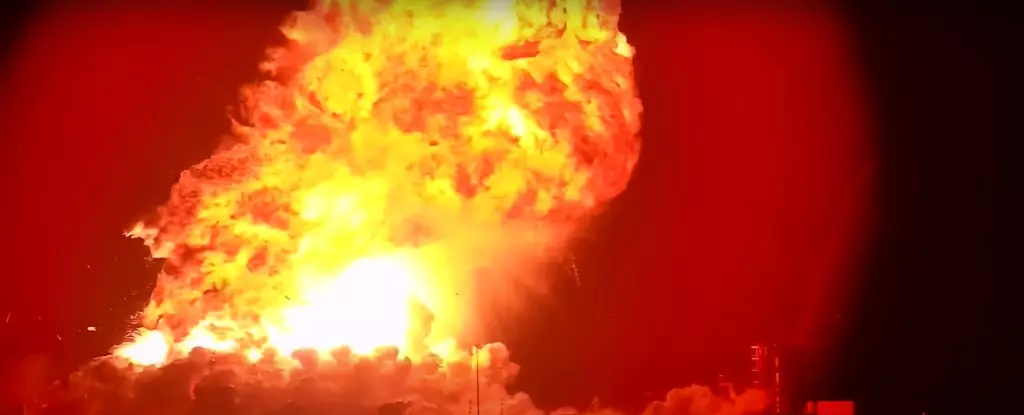In the world of aerospace, where risks are high and setbacks are inevitable, the recent explosion of a SpaceX Starship during a static fire test starkly embodies the perils of prioritizing speed over safety. Elon Musk, the billionaire visionary behind SpaceX, has cultivated an image of relentless progress, often dismissing failures as mere stepping stones on the path to greatness. However, the incident in Texas shouldn’t just be viewed as another blip on the radar—it’s a critical juncture that raises serious questions about the company’s operational ethos and the implications of its goals.
At approximately 11:00 PM local time, a towering fireball erupted at SpaceX’s Starbase facility, indicating a catastrophic failure during a routine test. While the company assures that no one was injured and all safety protocols were in place, the shockwaves reverberating through this incident are more significant than the flames that lit up the Texan night sky. This explosion—the fourth major failure of Starship in recent months—illustrates a troubling trend in SpaceX’s dealings with its most ambitious projects: a gamble on human lives and environmental safety in the name of achieving what can only be described as reckless haste.
Pushing the Limits: SpaceX’s ‘Fail Fast’ Ethos
SpaceX’s operational mantra, “fail fast, learn fast,” while innovative in its approach, runs the risk of normalizing failure rather than preventing it. The ability to quickly iterate and adapt is a hallmark of technological advancement, yet when the stakes involve rockets that will eventually carry human lives—and potentially colonize Mars—this ethos feels more like a dangerous gamble than a calculated risk. Each explosion, whether it’s a result of a pressurized tank malfunction or a robotic arm mishap, contributes to a cycle that raises eyebrows, even among supporters of rapid innovation.
This latest setback not only jeopardizes immediate timelines but also casts a shadow over Musk’s long-term vision. A fully reusable rocket with a payload capacity of 150 metric tons sounds impressive in theory, but does such grandiosity hold any merit when the foundation is rocked by repeated failures? The overarching goal of establishing human life on Mars is monumental in its scope, yet it necessitates a steadfast commitment to reliability—something that appears increasingly elusive.
Environmental Concerns: Ignoring the Dangers
The environmental impact of accelerated launch schedules cannot be understated, often glossed over in the excitement of technological advancement. The Federal Aviation Administration (FAA) recently approved an increase in annual Starship launches from five to twenty-five, disregarding objections raised by conservation groups about the risks to local wildlife. This callous approach to environmental stewardship reflects a broader trend in the pursuit of progress: economic and operational ambitions are often prioritized over the safety and health of our planet.
The ongoing reliance on SpaceX’s services by NASA speaks volumes about the dichotomy surrounding Musk’s empire. An agency traditionally rooted in scientific integrity is now aligned with a company that seemingly embraces chaos over caution. With Starship exploding as a backdrop, the reliance on hastily constructed prototypes underscores a problematic shift in values—one that risks degrading the ethical standards expected from entities that play pivotal roles in space exploration.
A Shift in Narrative: The Perils of Visionary Leadership
Elon Musk has established himself as a transformative figure in the tech industry, yet with every bold vision comes the risk of overreach. His readiness to dismiss a catastrophic event as “just a scratch” speaks to an alarming disconnect between rhetoric and reality. While Musk’s ambition to make humanity a multi-planetary species is undoubtedly inspiring, the approach taken by SpaceX warrants scrutiny.
The landscape of aerospace technology demands a measured response to failures, especially in endeavors that will one day carry human lives. SpaceX’s narrative of triumph through adversity is compelling, yet it veers dangerously close to romanticizing a reckless disregard for the very real consequences of failure. As the company pushes forward into uncharted territories, a recalibration towards cautious innovation and accountable operations is not just advisable—it’s necessary.
In pursuing the audacious dream of Mars colonization, SpaceX mustn’t lose sight of what it truly stands for: clear, responsible, and sustainable innovation. The dream should not come at the cost of humanity or the environment; instead, it must evolve in a way that respects both. Only then can we navigate the treacherous path of space exploration without igniting fiery disasters along the way.



Leave a Reply